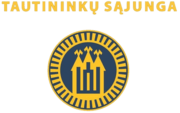Lithuanian Nationalist Union
Lithuanian Nationalist Union | |
|---|---|
 | |
| Leader | Audrius Rudys |
| Founded | August 19, 1924[1] |
| Headquarters | Vilnius |
| Membership | 1,453 (as of August 2012)[2] |
| Ideology |
Lithuanian nationalism National conservatism |
| Political position | Right-wing |
| Colours | Blue, Gold |
| Seimas |
0 / 141 |
| Website | |
|
tautininkai | |
The Lithuanian Nationalist Union (Lithuanian: Lietuvių tautininkų sąjunga, LTS), also known as the Nationalists (Tautininkai), is a nationalist, right-wing political party in Lithuania, founded in 1924 when the Party of National Progress merged with the Lithuanian Farmers' Association. It was the ruling party of Lithuania from the 1926 Lithuanian coup d'état in December 1926 to the Soviet occupation in June 1940. The party was re-established when Lithuania declared independence in 1990.
1924–1940
The party did not enjoy popular support and in the May 1926 parliamentary elections managed to win only 3 seats out of 85. However, its leaders Antanas Smetona and Augustinas Voldemaras were popular and influential public figures. The party was conservative and nationalistic; it stressed the need for a strong army and a strong leader.
During the December 1926 coup the military deposed the democratically elected government and invited Smetona to become the new President of Lithuania and Voldemaras the new Prime Minister. The Nationalists and the Lithuanian Christian Democrats formed a new government. However, the relationship between the two parties soon became tense as Christian Democrats regarded the coup as a temporary measure and wished to hold new elections to the Seimas. In April 1927 Smetona dissolved the Seimas and in May Christian Democrats resigned from the government. The Nationalists remained the only party in power for another thirteen years.
Voldemaras established Iron Wolf (Geležinis Vilkas) as the paramilitary wing of the Nationalists. Political opponents were incarcerated. The new constitution of 1928 established a presidential dictatorship. In 1929, Smetona removed his party colleague Voldemaras from the office of prime minister and ruled autocratically until Lithuania was conquered by the Soviet Union in 1940.[3]
The Nationalist Union had initial sympathies and contacts with the Mussolini regime.[4] However, Nationalist Union governments expressed disapproval of German racism and national-socialism as early as 1932, and staged Europe's first trial of Nazi criminals (in 1937).[5]
Since 1990
After the party was re-established in 1990, it played a diminishing role in Lithuanian politics. In the elections of the Seimas of 1992 the Lithuanian National Union won 4 places; in 1996 - 3 places, and since 2000 it has no representatives. The number of representatives in the regional municipalities is also diminishing: the party won 49 mandates in 1995, 23 in 1997, 13 in 2000, 14 in 2002 and 3 in 2007 elections.
On 11 March 2008 Lithuanian Nationalist Union merged in to Homeland Union, but in 2011 they announced their withdrawal from it.[6] The party declared its political resurrection in a General Assembly on 17 December 2011.
Two members of the party, Kazimieras Uoka and Gintaras Songaila were elected to Seimas of 2008-2012 (even though they were initially elected as the members of Homeland Union).
On 23 August 2013, Nationalist Union signed the Declaration of Bauska together with Conservative People's Party of Estonia and All for Latvia!. The declaration calls for a new national awakening of the Baltic states and warns about threats posed by international globalism, multiculturalism and Russian imperial ambitions.[7][8]
Citations
- ↑ www.tautininkai.lt/organizacija/istorija
- ↑ Lietuvos Respublikos politinių partijų sąrašas. Informacija atnaujinta 2012-08-02
- ↑ Berend, Iván T. (1998), Decades of Crisis: Central and Eastern Europe Before World War II, University of California Press, p. 134
- ↑ Roger Griffin. The Nature of Fascism. New York, New York, USA: St. Martin's Press, 1991. Pp. 121. The Lithuanian Nationalist Union was a member present at the 1934 Montreux Fascist conference.
- ↑ Matas Krygeris. Atsiminimai. Kaunas, Lithuania, 1994.
- ↑
- ↑ Nacionālā apvienība: Baltijas nacionālisti paraksta sadarbības līgumu, vēršoties pret globālajiem apdraudējumiem
- ↑ Baltimaade konservatiivid: aeg on küps uueks rahvuslikuks ärkamiseks
References
- Simas Sužiedėlis, ed. (1970–1978). "National movement". Encyclopedia Lituanica. IV. Boston, Massachusetts: Juozas Kapočius. p. 35. LCC 74-114275.
- "Lietuvių tautininkų sąjungos istorija" (in Lithuanian). Lithuanian Nationalists Union. Retrieved 2012-01-20.
External links
- (Lithuanian) Lithuanian Nationalist Union official website